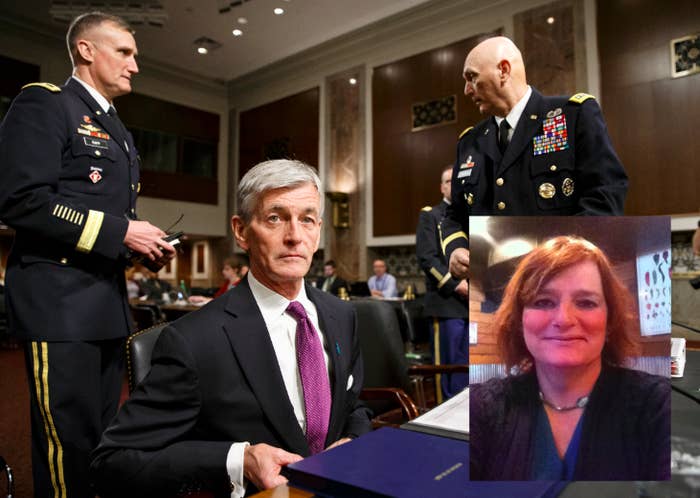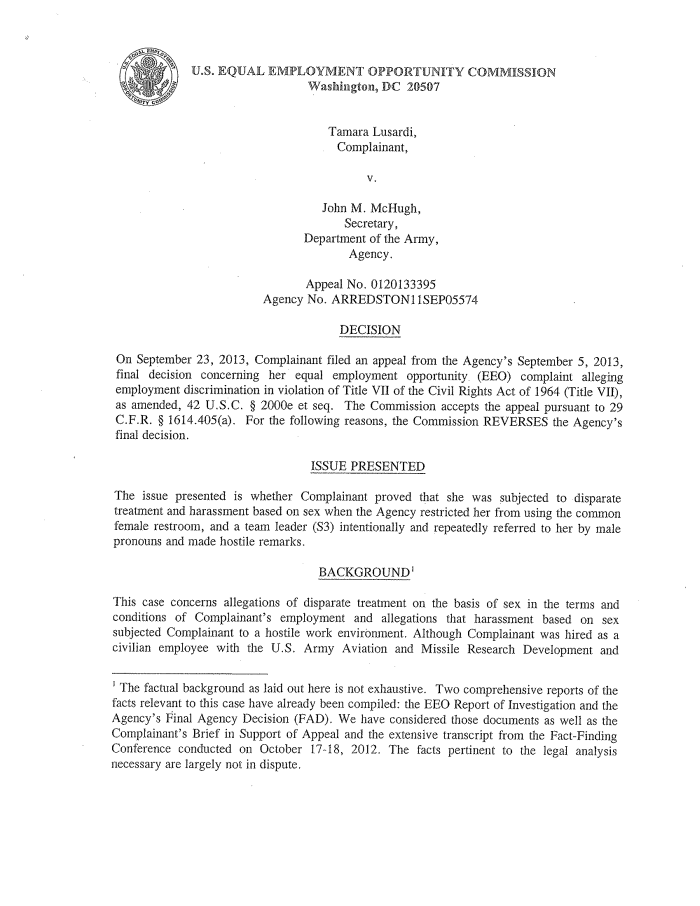
WASHINGTON — In a groundbreaking decision, the federal agency charged with enforcing anti-discrimination laws has held that some of the most common problems transgender people face in the workplace — including bathroom restrictions and supervisors not respecting name changes — can violate those laws.
In a decision dated April 1, the Equal Employment Opportunity Commission found that Tamara Lusardi "was subjected to disparate treatment on the basis of sex" — a violation of Title VII of the Civil Rights Act of 1964 — while working as a civilian employee at the Army's Aviation and Missile Research Development and Engineering Center in Huntsville, Alabama.
Lusardi was forced to use a single-user restroom and not the women's restroom after transitioning in 2010. On the occasions when she used the women's restroom — when the single-user restroom was out of order or being cleaned — she was confronted by a supervisor. In addition, a supervisor repeatedly, and in front of other employees, referred to Lusardi by her former male name and with male pronouns.
Lusardi brought a complaint against the Army based on the treatment she received. In the EEOC decision, provided to BuzzFeed News by Lusardi's lawyers, the independent agency found that in addition the disparate treatment violation of Title VII, the Army also was guilty of harassment, subjecting her to a "hostile work environment based on sex" due to the restroom restrictions and by allowing the misgendering to continue "well after [the supervisor] was aware that [Lusardi]'s gender identity was female."
Lusardi talked with BuzzFeed News about the decision on Tuesday, saying that despite the time it took for the complaint to be resolved, it was worth it for the potential impact it could have on others.
"I hope that the decision will help other transgender people feel safe enough to bring their full, authentic selves to work," she said. "We should be judged on the performance of our duties."
The decision comes almost three years after the EEOC ruled that discrimination against transgender people is a type of sex discrimination that violates Title VII of the Civil Rights Act of 1964. That case, brought by Mia Macy, set off a move throughout several federal government agencies — including the Justice Department — to recognize anti-transgender discrimination as a type of sex discrimination.
"With this ruling, it really builds on that," Transgender Law Center executive director Kris Hayashi told BuzzFeed News. "It's particularly groundbreaking in that it confirms that some of the most common forms of harassment faced by transgender people on the job should be recognized for what they really are, which is unlawful discrimination."
The agency's ruling is binding on federal agencies and departments, as well as applying to the EEOC's own enforcement and litigation activities, including at its field offices throughout the country. Although not binding on courts, the EEOC's interpretation of Title VII law generally is considered persuasive authority.
To those ends, the EEOC used the opinion to establish some bright-line rules going forward with some of those more common issues faced in transgender discrimination claims.
"Nothing in Title VII makes any medical procedure a prerequisite for equal opportunity (for transgender individuals, or anyone else)," the opinion states. "An agency may not condition access to facilities — or to other terms, conditions, or privileges of employment — on the completion of certain medical steps that the agency itself has unilaterally determined will somehow prove the bona fides of the individual's gender identity."
Later, when discussing the Army's claim that it restricted Lusardi's restroom use due to potential discomfort of other employees, the EEOC found that "supervisory or co-worker confusion or anxiety cannot justify discriminatory terms and conditions of employment. … Allowing the preferences of co-workers to determine whether sex discrimination is valid reinforces the very stereotypes and prejudices that Title VII is intended to overcome."
Finally, in addressing the incorrect name and pronoun usage, the EEOC ruled, "Persistent failure to use the employee's correct name and pronoun may constitute unlawful, sex-based harassment if such conduct is either severe or pervasive enough to create a hostile work environment when judged from the perspective of a reasonable person in the employee's position."
The ruling has been a long time coming for Lusardi, who first contacted an EEO counselor on September 6, 2011, and filed her formal complaint more than three years ago, on March 14, 2012. Another agency, the Office of Special Counsel, reached a similar conclusion last year about the treatment Lusardi received in a decision about whether the treatment constituted a "prohibited personnel practice."
"It's been very stressful, a lot of sleepless nights, a lot of work," she said, thanking the Transgender Law Center for the group's work on her case. Now that the decision has come down, though, she said, "I'm hoping it sets an important precedent, and I want to make sure it doesn't happen to other people, whether it be in the federal arena or in public as a whole."
While acknowledging the difficulties Lusardi faced, Hayashi sounded a hopeful note, saying, "This decision is really critical in that it ensures that all workers have a fair chance to earn a living and focus on their job free from harassment in the workplace."
It was not immediately clear how the EEOC decision will be received by government agencies and LGBT organizations. When the Macy decision came down in 2012, there initially was some reticence from other LGBT groups to discuss the ruling's potential impact and from some areas of the federal government to apply the ruling to related legal provisions. Eventually, though, almost all LGBT groups and federal agencies joined in pressing the case that Title VII's sex discrimination ban includes anti-transgender discrimination.

